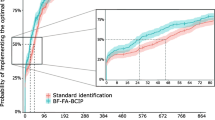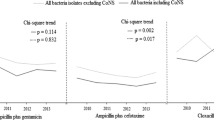Abstract
Background
The Xpert MRSA/SA blood culture assay (Cepheid, USA) is a rapid PCR test which can be used for positive blood cultures where Gram-positive cocci in clusters are seen. It can detect Staphylococcus aureus and also the mecA gene, which encodes for β-lactam resistance. The assay was introduced into the Rotunda Hospital for positive blood cultures to allow earlier detection of MRSA and methicillin susceptible S. aureus.
Aim
To assess the impact of the Xpert MRSA/SA blood culture assay on the management of obstetric patients with a positive blood culture where Gram-positive cocci in clusters were seen. The main outcome measures were duration of intravenous antimicrobials and length of admission.
Methods
Pre-intervention and post-intervention groups were identified relating to whether or not the test was in use at the time. A standardised form was used to retrospectively review the medical notes and laboratory results.
Results
There were 35 obstetric patients with positive blood cultures with Gram-positive cocci in clusters in the pre-intervention group and 22 cases in the post-intervention group. All 22 positive blood cultures in the post-intervention period were correctly identified. The antimicrobial duration was reduced from a median of 55.5–43.5 h and length of admission reduced from a median of 66.5–56 h (Mann–Whitney U value = 161, p = 0.46 and U value = 256, p = 0.15, respectively).
Conclusion
This study has shown a reduction in the median duration of intravenous antimicrobials and admission; however, larger multi-centre studies are needed to evaluate this potential benefit further.

Similar content being viewed by others
References
Bates DW, Goldman L, Lee TH (1991) Contaminant blood cultures and resource utilization. The true consequences of false-positive results. JAMA 265(3):365–369
Zwang O, Albert RK (2006) Analysis of strategies to improve cost effectiveness of blood cultures. J Hosp Med 1(5):272–276. doi:10.1002/jhm.115
Alahmadi YM, Aldeyab MA, McElnay JC et al (2011) Clinical and economic impact of contaminated blood cultures within the hospital setting. J Hosp Infect 77(3):233–236. doi:10.1016/j.jhin.2010.09.033
Frye AM, Baker CA, Rustvold DL et al (2012) Clinical impact of a real-time PCR assay for rapid identification of staphylococcal bacteremia. J Clin Microbiol 50(1):127–133. doi:10.1128/jcm.06169-11
Buchan BW, Allen S, Burnham CA (2015) Comparison of the next-generation Xpert MRSA/SA BC assay and the GeneOhm StaphSR assay to routine culture for identification of Staphylococcus aureus and methicillin-resistant S. aureus in positive-blood-culture broths. J Clin Microbiol 53(3):804–809. doi:10.1128/jcm.03108-14
Parta M, Goebel M, Matloobi M, Stager C, Musher DM (2009) Identification of methicillin-resistant or methicillin-susceptible Staphylococcus aureus in blood cultures and wound swabs by GeneXpert. J Clin Microbiol 47(5):1609–1610. doi:10.1128/jcm.00351-09
Allaouchiche B, Jaumain H, Zambardi G, Chassard D, Freney J (1999) Clinical impact of rapid oxacillin susceptibility testing using a PCR assay in Staphylococcus aureus bactaeremia. J Infect 39(3):198–204
Dhooria S, Gupta N, Bal A et al (2016) Role of Xpert MTB/RIF in differentiating tuberculosis from sarcoidosis in patients with mediastinal lymphadenopathy undergoing EBUS-TBNA: a study of 147 patients. Sarcoidosis Vasc Diffuse Lung Dis: Off J WASOG 33(3):258–266
Kelly-Cirino CD, Curry PS, Marola JL, Helstrom NK, Salfinger M (2016) Novel multi-day sputum transport reagent works with routine tuberculosis tests and eliminates need for cold chain: preliminary study of compatibility with the Xpert(R) MTB/RIF assay. Diagn Microbiol Infect Dis 86(3):273–276. doi:10.1016/j.diagmicrobio.2016.08.013
Moussa H, Bayoumi FS, Ali AM (2016) Evaluation of GeneXpert MTB/RIF assay for direct diagnosis of pulmonary tuberculosis. Saudi Med J 37(10):1076–1081. doi:10.15537/smj.2016.10.14998
Zboromyrska Y, De la Calle C, Soto M et al (2016) Rapid diagnosis of staphylococcal catheter-related bacteraemia in direct blood samples by real-time PCR. PLoS One 11(8):e0161684. doi:10.1371/journal.pone.0161684
Spencer DH, Sellenriek P, Burnham CA (2011) Validation and implementation of the GeneXpert MRSA/SA blood culture assay in a pediatric setting. Am J Clin Pathol 136(5):690–694. doi:10.1309/ajcp07ugyokbvvnc
Author information
Authors and Affiliations
Corresponding author
Ethics declarations
Conflict of interest
None of the authors have a relevant conflict of interest to disclose. No money was received from Cepheid for this project. The research was part of a quality improvement programme.
Funding
The GeneXpert platform was funded by Health Service Executive-Dublin North East Regional Healthcare Associated Infection/Antimicrobial Resistance Committee. Consumables were purchased through routine laboratory funds. No authors received payment for this study.
Informed consent
Consent was not obtained from patients as this was a retrospective audit and the standard treatment at that time was used as part of their care.
Ethical approval
All procedures performed in studies involving human participants were in accordance with the ethical standards of the institutional and/or national research committee and the 1964 Helsinki declaration and its later amendments or comparable ethical standards.
Rights and permissions
About this article
Cite this article
Page, A., O’Rourke, S., Brennan, M. et al. Impact of Xpert MRSA/SA blood culture PCR assay on management of positive blood cultures in obstetric patients: a retrospective audit. Ir J Med Sci 186, 995–998 (2017). https://doi.org/10.1007/s11845-017-1581-4
Received:
Accepted:
Published:
Issue Date:
DOI: https://doi.org/10.1007/s11845-017-1581-4




